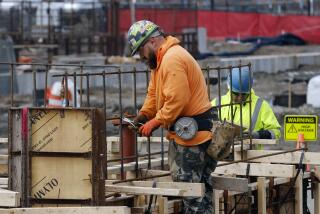Oil Service Industry Recovery Hindered by Labor Shortage
LAFAYETTE, La. — Oil-field service companies, buoyed by a mild rebound, are looking for workers and having a hard time finding them.
“We’ve hired 100 people in 90 days, and I need 40 more people now,” said Dailey Berard, president of Universal Fabricators.
“I see it as a serious problem for the industry to get back in the business,” he said. “The materials are not here; the personnel are not here, and the expertise has been retired.”
Even so, the news is not necessarily as encouraging as it appears, one industry official said.
Chuck Barden, head of the Denver-based International Assn. of Geophysical Contractors, said he believes that the hiring may result in new wells--but not new sources of supply. That is because the drilling is in already-known oil fields.
Chicken and Egg
Berard said 13 of 15 calls to former employees in Louisiana recently were answered by their wives with the news that their husbands now work out of state.
“The wives have said they’d pass the word to them,” Berard said. “But they’ve migrated to other states, and luring them back is going to be difficult because we can’t pay the wages they’re making now.”
Skilled laborers are a virtual necessity because the market is still highly competitive, but Berard said people with rusty skills should be able to get work after taking refresher courses in local vocational-technical or trade schools.
“We’re advertising for structural welders and fitters in all the outlying communities, and it looks like we’ll have to go beyond that.”
At Schlumberger Well Service, district land manager Jim Malone said he was having trouble finding trained mechanical and electrical engineers.
“There’s not a shortage of semiskilled workers, but the engineers we hire have to be trained for at least six months,” he said.
Back to School
His office is three engineers short and has tried but failed to entice former engineers from other Schlumberger offices throughout the country into moving to Louisiana.
During last year’s severe downturn, in which oil prices dropped to levels of $10 a barrel or less, Schlumberger engineers took advantage of a company offer to send them back to school to get master’s degrees in exchange for a three-year commitment to the company.
Malone said a number of engineers have completed their studies and taken various other jobs.
He said oil-field activity is expected to increase in the next several months, so companies are adjusting their budgets for the anticipated upturn.
At Chevron, the experience was different. Ray Wilcox, Chevron’s field operations superintendent, said he has had a limited number of new jobs and no trouble filling them. A recent ad for mechanics and electricians drew 200 applicants.
In Tulsa, a spokesman for the American Assn. of Petroleum Geologists said the labor situation is tight in all the oil states.
Not in Oil Patch
“Oil field workers by and large are semiskilled workers, able to work in any given industry at any given time. Now, they’ve left this part of the country and gone to Atlanta, Kansas City--places where there’s been work,” Larry Nation said.
“They’re not in the Oil Patch. And when the Oil Patch is finding itself with a need for people, they’re not there,” he said.
Although the labor shortages are real, Barden warned that it does not necessarily mean the nation’s energy problems are lessening.
More to Read
Sign up for Essential California
The most important California stories and recommendations in your inbox every morning.
You may occasionally receive promotional content from the Los Angeles Times.










